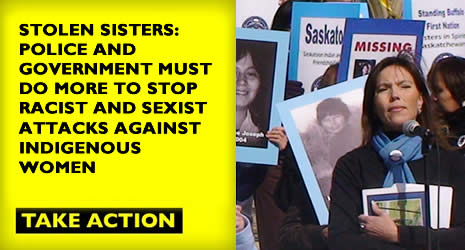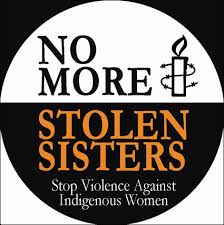The shocking rate of violence faced by First Nations, Inuit and Métis women and girls in Canada is nothing less than a national human rights crisis.
Responding to the growing demand for a National Public Inquiry into this crisis, Minister of Justice Peter MacKay has repeatedly stated that Canada needs action, not more studies. To support this position he has distributed a list of 40 reports that previously examined the issue of missing and murdered Indigenous women and girls or related factors that put Indigenous women and girls at risk.
Minister MacKay, as an organization that wrote two of the reports on your list, Amnesty International strongly objects to our work being used as a justification for not calling a National Public Inquiry into violence against Indigenous women.
The list of 40 reports is not a defence of the government’s record or approach. When we reviewed this list, what we found was an extensive body of recommendations which have largely been ignored at all levels of government. Furthermore, we noted that many of the reports were prepared by organizations that have since faced dramatic budget cuts that have undermined or altogether prevented their doing continued work on these issues.
In other words, this list of 40 reports is an indictment of the continued refusal of governments in Canada to listen to and act on the recommendations coming from organizations and commissions that have already looked in the issue and called for genuine and effective action.
The vastly disproportionate rate of violence experienced by Indigenous women and girls requires not just any action, but action that is well-informed, consistent with the gravity and pervasiveness of the violence, and carried out in collaboration with the affected families and expert organizations that best understand the unique patterns of violence threatening the lives and safety of Indigenous women and girls.
As Amnesty International has repeatedly stated, the actions taken by the federal government to date fall far short of what is needed to protect the human rights of Indigenous women and girls. We have stood alongside the Native Women’s Association of Canada and many others in calling for a comprehensive and coordinated National Action Plan that includes and is informed by a National Public Inquiry. And we have welcomed the support of provinces and territories for a National Public Inquiry. In rejecting calls for such an inquiry, your government is denying Indigenous families and all Canadians one of the crucial tools needed to put Canada on the right course.
Ten years ago, when we published our “Stolen Sisters” report, we noted that numerous studies had already identified measures needed to reduce the threats to Indigenous women and girls and to ensure effective police response when their lives are in danger. Our point was not that the work had already been done and the concerns addressed. To the contrary, we noted that important gaps remained in public understanding of the unique patterns of violence facing Indigenous women and girls. Even more importantly, we pointed out that the vast majority of recommendations already brought to the attention of government had gone unimplemented. We called for previous inquiries and studies to be reviewed and implemented. Sadly this has never happened.
We did not, at that time, call for a national public inquiry. We hoped that once there was public acknowledgement of the horrific rates of violence facing Indigenous women and girls, responsible governments would act immediately to implement the most urgently needed measures to ensure Indigenous women’s safety and work with Indigenous women to develop and implement, as soon as possible, a comprehensive, coordinated long term plan of action. This has not happened. Indeed, the failure to do so has been so great that one of the most obvious and necessary first responses, for the national police service to identify and make public its best information on the numbers of missing and murdered Indigenous women, has only just happened now, ten years after the release of our report. What this tells us is that much greater transparency and accountability is needed. That concern alone urgently necessitates a national public inquiry.
This failure to act is a blatant contravention of the fundamental human rights obligation of all governments to take every reasonable measure to protect the rights to live free from violence and discrimination.
We are not alone in pointing out this failure. Most recently, the BC Missing Women Commission of Inquiry (2012) noted that the majority of “very practical” recommendations from the 2006 Highway of Tears Symposium had gone unimplemented. Indigenous peoples’ organizations and frontline service providers are now raising serious concerns over the implementation of the BC Inquiry’s recommendations.
The BC Inquiry report, the Highway of Tears Symposium report, and reports which we cited in 2004 – the Royal Commission on Aboriginal Peoples and the Manitoba Justice Inquiry – are all on the list which you’ve circulated.
To be clear: no one wants to add another unimplemented and ignored inquiry report to this growing list of shame. Critically, however, this very obviously does not have to be the fate of a National Public Inquiry. To the contrary, properly constituted and supported, a National Public Inquiry can ensure that the voices of affected families and communities are finally heard and listened to, and it can serve to hold all levels of government accountable for real and meaningful action to stop the violence.
Minister MacKay, we couldn’t agree more that Canada needs action. The federal government should develop a framework for action with Indigenous women’s organizations, which includes a National Public Inquiry and a comprehensive and time bound National Action Plan on violence against Indigenous women. This action should be grounded in recommendations from previous studies. And most importantly, action must be responsive to the needs of the very community whose rights are in need of protection.
For more information about human rights issues in Canada and around the world, visit Amnesty International Canada.
By Alex Neve, Secretary General, Amnesty International Canada and Beatrice Vaugrante, Directrice Générale, Amnistie internationale Canada



Be the first to comment on "Canada needs to take concrete action to address violence against Indigenous women"